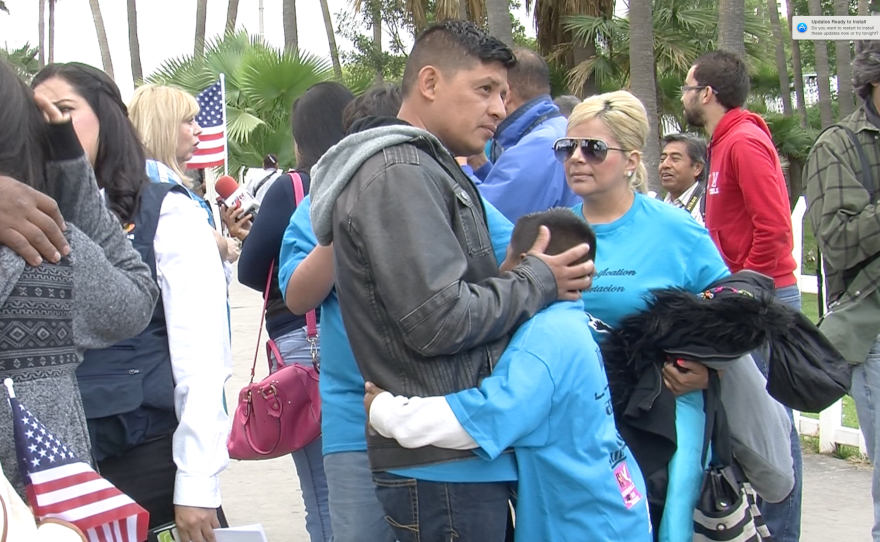Update 5/8/15
U.S. immigration officials have denied requests for humanitarian parole from five Mexicans who staged a small protest at the San Ysidro port of entry on Thursday.
Humanitarian parole allows foreigners with a compelling emergency to enter the U.S. temporarily.
Victor Ledezma was one of the applicants. He says he needs to return to the U.S. for the sake of his nine-year-old U.S.-citizen son in San Diego. The boy suffers from epileptic seizures, and a UC San Diego neurologist is recommending the family be reunited to improve the child's health.
“They processed our applications, but they don’t want to help,” Ledezma said.
The U.S. Customs and Border Patrol declined to comment on the specifics of the five cases.
“Parole is an extraordinary measure sparingly used only in urgent and emergency circumstances,” said CBP spokeswoman Jacqueline Wasiluk in an email.
Ledezma says he and the other four Mexicans plan to re-apply.
Original Story from 5/7/15
Nine-year-old San Diego resident, Yethvik Ledezma, started having seizures about a month after he learned his father was stuck in Mexico.
His father, Victor, went across the border to visit his dying father in Mexico City about five years ago. He had been living in the U.S. illegally with his son and wife, who are U.S. citizens.
"When I tried to come back (to the U.S.), I couldn't," Ledezma said. "And then my son got sick."

The Ledezmas were among five families who went to the San Ysidro port of entry Thursday to apply for humanitarian parole, which allows foreigners with a compelling emergency to enter the country temporarily. Immigration reform policies so far proposed by President Barack Obama wouldn't benefit families that have already been separated.
His son and wife, Yethel, accompanied Ledezma to the port of entry, where they chanted with other families: "Family reunification, no more deportation!"
Yethel brought her husband a letter from a UC San Diego neurologist who recommends that the family be allowed to reunite. The neurologist wrote that anxiety and poor sleep related to the boy's separation from his father are contributing to his seizures. Ledezma gave this letter and other documents to immigration officials.
Yethvik, his son, said he wants his father back at home.
"I just get sick. Because I just get worried about him," the boy said.
In the U.S., Ledezma worked as a car mechanic and dealer in Los Angeles. His wife and son moved to San Diego to be closer to him in Tijuana after he was denied entry back into the U.S..
Yethel can't work because of an injured hip and ankle, so Ledezma sends his wife and son money from Tijuana. But Ledezma doesn't earn as much as he did in the U.S., and the medical bills are getting more expensive.
With her arm around her son, Yethel said, ""He needs the return of his father,"
They're waiting to find out what happens, and are expecting a response within two days.
"I hope that my dad can finally come back so everything goes better now," the boy said.
This report is part of KPBS' Fronteras Project, a regional news collaborative that produces reports on the changing culture and demographics of the American West and Southwest. Fronteras reporting is made possible by a grant from the Corporation for Public Broadcasting.







